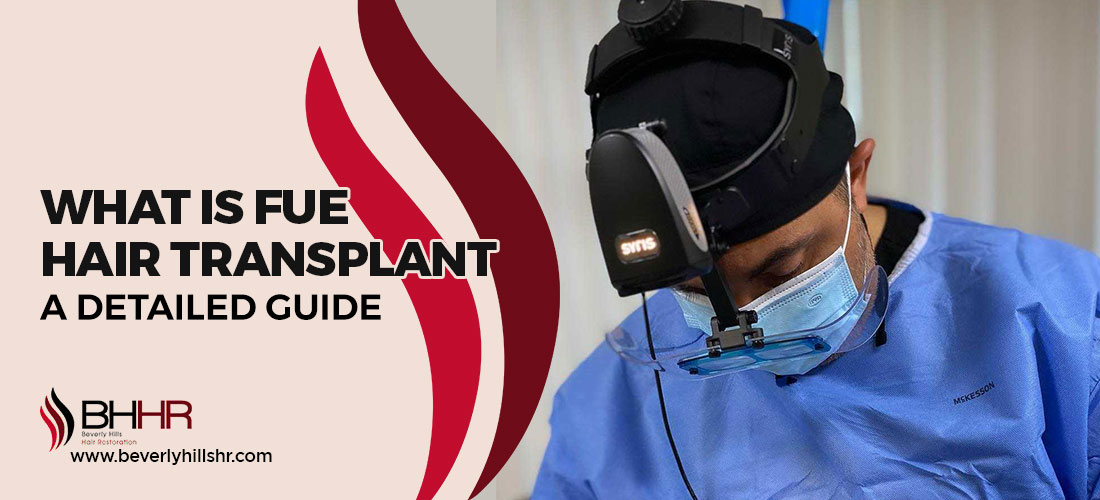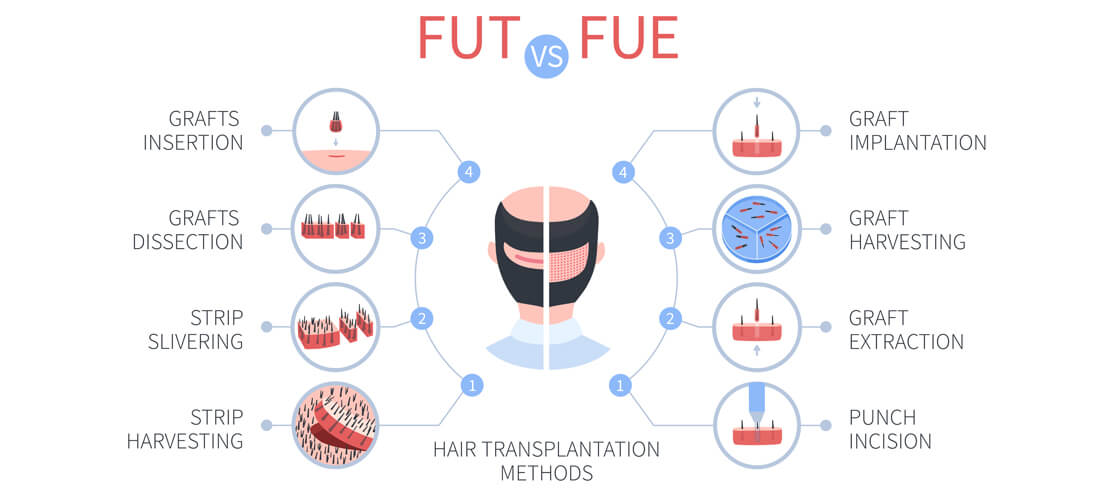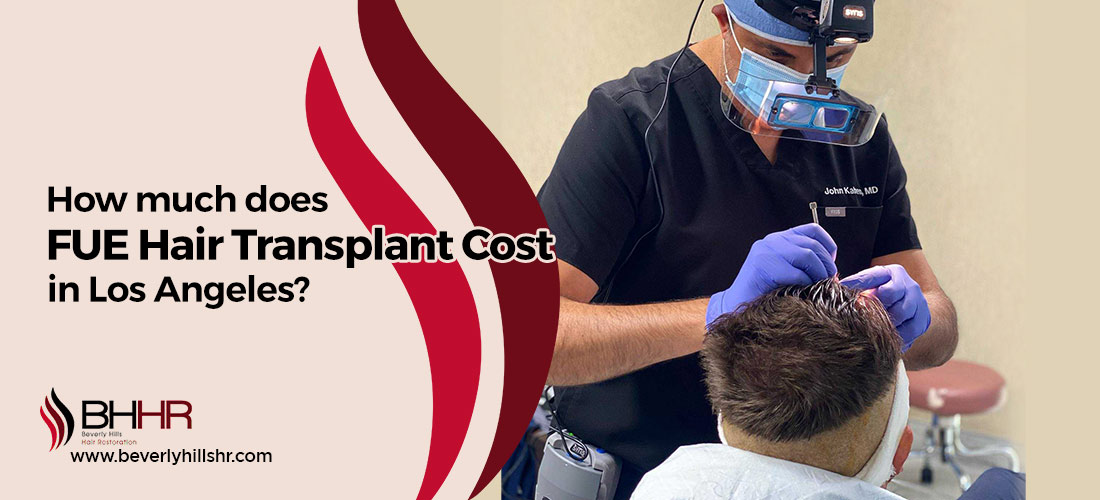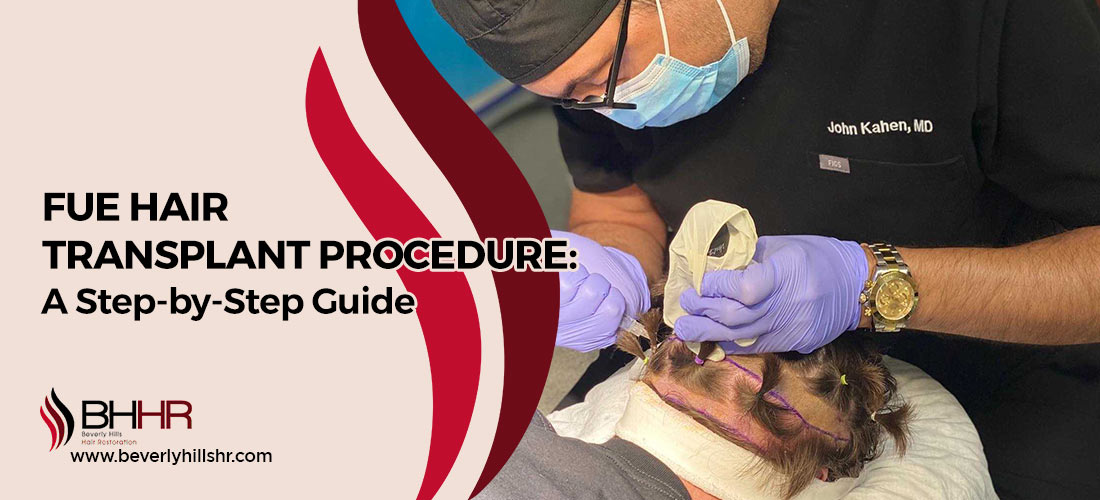What is FUE Hair Transplant: A Detailed Guide
Home / FUE Hair Transplant / What is FUE Hair Transplant: A Detailed Guide
Updated On : July 18, 2024 | Category : FUE Hair Transplant | Author: Beverly Hills Hair Restoration Team

When individuals seek practical solutions for hair loss, they often inquire about FUE hair transplants. Follicular Unit Extraction (FUE) is a traditional method for effectively combating hair loss. At our clinic, we offer an advanced technology called Smart FUE, where Dr. John Kahen injects plasma into the scalp using Smart PRP Methods, enhancing the procedure's effectiveness. We delicately harvest hair follicles at Beverly Hills Hair Restoration from a designated donor area, typically located at the back of the scalp, before meticulously transplanting them into areas experiencing baldness or thinning. Unlike traditional methods, Smart FUE leaves no linear scars and boasts a quicker recovery time, making it a preferred choice for many seeking solutions for hair loss.
What Is FUE Hair Transplant
The minimally invasive FUE hair transplant process has transformed the hair restoration industry. FUE directly separates individual hair follicles from the scalp with a precise, circular instrument, which removes a strip of the scalp from the rear of the head. This meticulous approach allows for selecting only the healthiest follicles, which are then transplanted to the balding areas of the scalp.
The process begins with the application of local anesthesia to the donor area, ensuring a pain-free experience. A specialized punch device is then used to make a tiny, circular incision around a hair follicle before it's gently extracted. Once enough follicles have been harvested, they are prepared and meticulously placed into the recipient areas, where they will grow into healthy, natural-looking hair.
The procedure of FUE Hair Transplant
Our top priority is to provide patients comfort and safety during the fue hair transplant procedure at Beverly Hills Hair Restoration in Los Angeles. Below is a comprehensive overview of what patients can anticipate at each process stage.
- Pre-operative Preparation: Dr. John Kahen ensures you're ready, including shaving the donor area and providing detailed care instructions for a smooth experience.
- Anesthesia: Local anesthesia is administered for a pain-free experience, with Dr. Kahen addressing any concerns to ensure your comfort throughout the procedure.
- Extraction: Dr. Kahen meticulously removes individual follicular units using specialized tools, minimizing damage to surrounding tissue and ensuring optimal results.
- Recipient Site Creation: FUE's minimally invasive nature reduces scalp trauma, enhancing patient comfort and allowing for quicker recovery times.
- Injecting Plasma: We utilize the Smart PRP® method, where Dr. Kahen injects plasma into the recipient area before transplanting the hair follicle.
- Implantation: The hair transplant doctor precisely places each follicular unit into the recipient area, ensuring natural-looking results and the desired hair density and coverage.
FUE Hair Transplant Recovery
Recovering from an FUE Hair Transplant is crucial to the hair restoration journey. At our hair transplant clinic, we ensure that our patients are well-informed and supported throughout the recovery process. Here are some key points to consider.
- Minimal Downtime: Many patients can return to normal activities within a few days post-surgery.
- Mild Discomfort: Any discomfort is typically mild and manageable with prescribed pain medication.
- Swelling and Redness: Some swelling and redness around the treated area are normal and usually subside within the first week.
- Scab Formation: Small scabs around the transplanted follicles are expected to fall off naturally within 7-10 days.
- Hair Growth: Initial hair growth can be seen as early as three months post-transplant, with full results visible after 9-12 months.
- Follow-up Care: Adhering to post-operative instructions and attending follow-up appointments are crucial for optimal healing and results.
FUE Hair Transplant Procedure Cost
In Beverly Hills Hair Restoration, the average cost of an FUE hair transplant tends to be higher, typically within the range of $5,000 to $20,000. This innovative technique, priced between $8 to $10 per graft, entails meticulous hair extraction from the donor site, typically at the scalp's back. These follicles are then meticulously transplanted to the recipient area. The overall cost of an FUE procedure is determined by factors such as the required number of grafts and the utilization of advanced technology.
Advantages of FUE Hair Transplantation
Hair transplantation with FUE (Follicular Unit Extraction) is the favored treatment for treating hair loss because of its novel approach and many advantages. With results that complement your natural hair flawlessly, this procedure provides a minimally intrusive solution. Below are the key fue hair transplant benefits succinctly highlighted:
- Minimal Scarring
- Faster Healing
- Less Discomfort
- No Stitches
- Natural-looking Results
- Versatility
- Suitable for All Hair Types
Who is a Good Candidate for FUE
Determining who is an ideal candidate for a Follicular Unit Extraction (FUE) hair transplant is crucial for achieving the best outcomes. Here are the key points that help identify suitable candidates:
- Sufficient Donor Hair: Prospective candidates should possess resilient donor follicles on the scalp's rear or sides. These hairs are resistant to thinning and will serve as the source for transplantation.
- Mild to Moderate Hair Loss: Follicular Unit Extraction (FUE) is best suited for individuals with mild to moderate hair loss, as its effectiveness may be limited for those in more advanced stages of hair loss.
- Healthy Scalp: A successful Follicular Unit Extraction (FUE) treatment requires a healthy scalp. Conditions such as psoriasis or dermatitis may impact an individual's eligibility for treatment.
- Realistic Expectations: Candidates considering Follicular Unit Extraction (FUE) should have realistic expectations about the results. While it can improve hair density significantly, it may not fully restore a full head of hair.
- Flexibility in Hairstyle: FUE may require shaving or trimming the donor area for optimal results. Candidates should be comfortable with temporary changes in hairstyle.
Conclusion: Choosing the Best for a Successful Outcome
This article teaches us what a FUE hair transplant is, its method, and its advantages. FUE represents a remarkable advancement in combating hair loss, characterized by its minimally invasive technique and potential for yielding natural-looking results with minimal downtime. By meticulously selecting individual follicles for transplantation at BHHR, FUE methods ensure a tailored approach to address each patient's needs, ultimately delivering aesthetically pleasing and enduring results. FUE presents an exciting avenue for those looking to regain their hair and reclaim their self-assurance, guiding them toward a revitalized self-assurance, all within the expert hands of Dr. John Kahen at Beverly Hills Hair Restoration in Los Angeles.
Schedule your free hair transplant consultation today! Call us at 310.289.0901 or visit our clinic to book your appointment.



